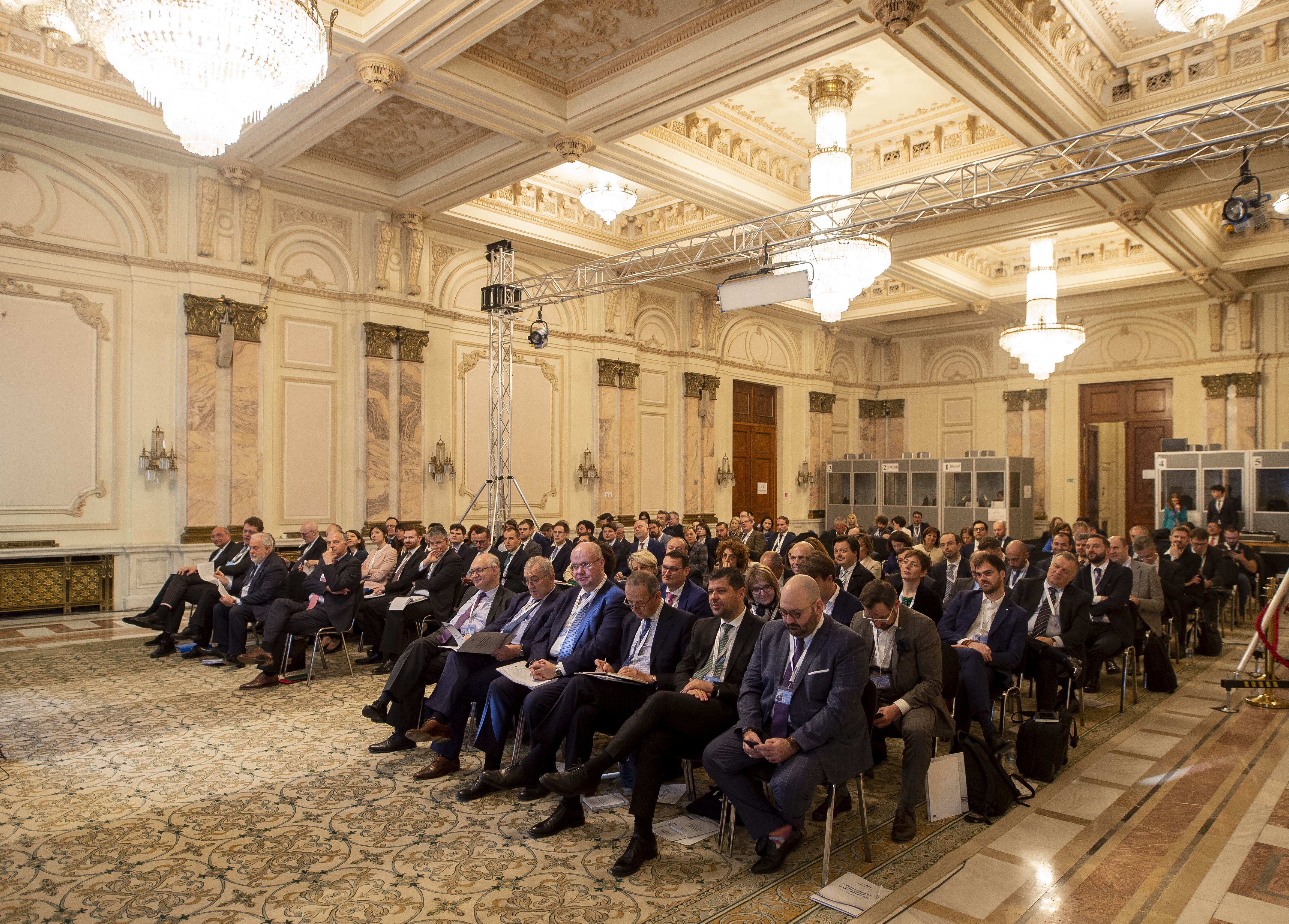Future Energy Systems: Sustainable and smart gas infrastructure, supported by hydrogen and other renewable gases
Aspen Institute Romania (AIR) and the Ministry of Energy of Romania organized the high-level conference “Future Energy Systems: Sustainable and smart gas infrastructure, supported by hydrogen and other renewable gases”. The event took place in Bucharest, on the 1st of April 2019, on the margins of the Ministerial meeting on Central and South Eastern Europe Energy Connectivity (CESEC), at the Palace of Parliament.
The Conference aimed at the dissemination of policy developments to relevant stakeholders and at identifying possible solutions to advance the European energy agenda. The Conference focused on key topics on the EU and Romanian Presidency agenda, such as the future European energy system, innovation and digitalisation of energy networks, decarbonising the energy sector and ensuring the transition to a low-carbon economy (including the use of hydrogen).
Furthermore, a Declaration on Sustainable and Smart Gas Infrastructure for Europe was signed by representatives of the industry during the Conference. The Declaration states that the signatories aim to maximise the potential of the natural gas infrastructure to accommodate increasing shares of near-zero carbon hydrogen and renewable gases.
The Conference brought together major European and Romanian decision-makers (including Miguel Arias Cañete, EU Commissioner for Climate and Energy, Anton Anton, Romanian Minister of Energy, and Dominique Ristori, Director General – DG ENERGY, European Commission), renowned European and national energy sector experts, key representatives of the business sector and industry associations from Romania and abroad, as well as representatives of academia and NGOs.
The Conference was part of Aspen Institute Romania’s Energy and Sustainability Program, which represents a dedicated platform for open policy dialogue and a neutral forum focused on key energy topics and on ways of promoting environmental sustainability in a technological world.
Conference Organizers:
Aspen Institute Romania
Ministry of Energy of Romania
Conference Partners:
ENEL
Transgaz
Agenda
1st April 2019
Nicolae Bălcescu Hall, Palace of Parliament, Bucharest, Romania
AGENDA
08.30 – 09.00 Registration and coffee
09.00 – 09.30 Welcome and political session
➢ Welcome by Mircea Geoană, President Aspen Institute Romania
➢ Political statements:
Miguel Arias Cañete, EU Commissioner for Climate and Energy
Anton Anton, Minister of Energy, Romania
09.30 – 09.45 Keynote: EU long-term decarbonisation strategy and future energy systems
Dominique Ristori, Director General – DG ENER
09.45 – 10.45 Discussion panel and Q&A session: Industry perspective on future energy networks
Moderated by Klaus Dieter Borchardt, DG ENER
Representatives from industry will present and discuss their perspective in terms of necessary innovative solutions to address the decarbonisation of the energy grids and facilitate the integration of growing shares of renewable energy. They will particularly address the role of hydrogen in supporting sectoral integration as well as the issue of digitalisation. Existing barriers and possible ways to eliminate them will also be an important part of the discussion.
• Uffe Borup, VP Technology, Nel Hydrogen
• Simone Mori, Head of Europe and Euro-Mediterranean Affairs, ENEL
• James Watson, Secretary General, Eurogas
• Walburga Hemetsberger, CEO, SolarPower Europe
• Antón Martínez, Chief Transformation Officer, Enagas
• Stephan Kamphues, President, ENTSOG
• Laurent Théry, Senior Vice President International and Business Development, GRTGaz
• Ion Sterian, Director General, Transgaz
• Pieter van Aartsen, Board Member Gas Infrastructure Europe
• Ralf Wezel, Secretary General, EUTurbines
10.45 – 11.00 FCH JU & Hydrogen Europe – Hydrogen Roadmap for Europe
• Valerie Bouillon Delporte, Chair, Hydrogen Europe
• Bart Biebuyck, Director, FCH JU
11.00 – 11.20 Coffee break
11.20 – 12.35 Discussion panel and Q&A session: From projects to regulations for an integrated energy system in the digital era
Moderated by Tudor Constantinescu, DG ENER
The transition towards low-carbon energy systems in Europe will likely be supported by sectoral integration and digitalization. Policy and regulatory will need to be developed to ensure a smooth and effective energy transition. While sectoral integration will enable a better large-scale integration of renewables and a more comprehensive approach regarding system efficiency, digitalisation is a process expected to enable several desirable evolutions: the emergence of prosumers, improved energy efficiency, improved distribution services, integrating electric mobility and vehicles to grid, and others. Digitalisation is also an enabler of sector integration, where different end-use sectors (buildings, transport and industry) will become more closely interlinked. This panel will discuss which regulations and policies can better support these key trends in the development of future energy systems, in order to deliver on the clean energy transition.
• Jorgo Chatzimarkakis, Director Hydrogen Europe
• Clara Poletti, Chair ACER Board of Regulators
• Razvan Nicolescu, Energy & Resources Industry Leader at Deloitte Romania
• Domenico Maggi, Head of EU Government Affairs, SNAM
• Lazăr Comănescu, Counsellor, Romanian Chamber of Commerce and Industry
• Bjørn Haugstad, Director General, Head of Climate, Industry and Technology Department, Ministry of Petroleum and Energy, Norway
• Ulrich Benterbusch, Deputy Director General, Federal Ministry for Economic Affairs and Energy of Germany
• Noe van Hulst, Hydrogen Envoy for the Ministry of Economic Affairs & Climate Policy, The Netherlands
• Thomas Egebo, President and CEO, Energinet
• Nils Aldag, Chief Financial Officer, Sunfire
12.35 – 12.45 Conclusions
12.45 – 13.00 Signature by Industry of a Declaration on Sustainable and Smart Gas Infrastructure for Europe
13.00 -14.00 Networking lunch



